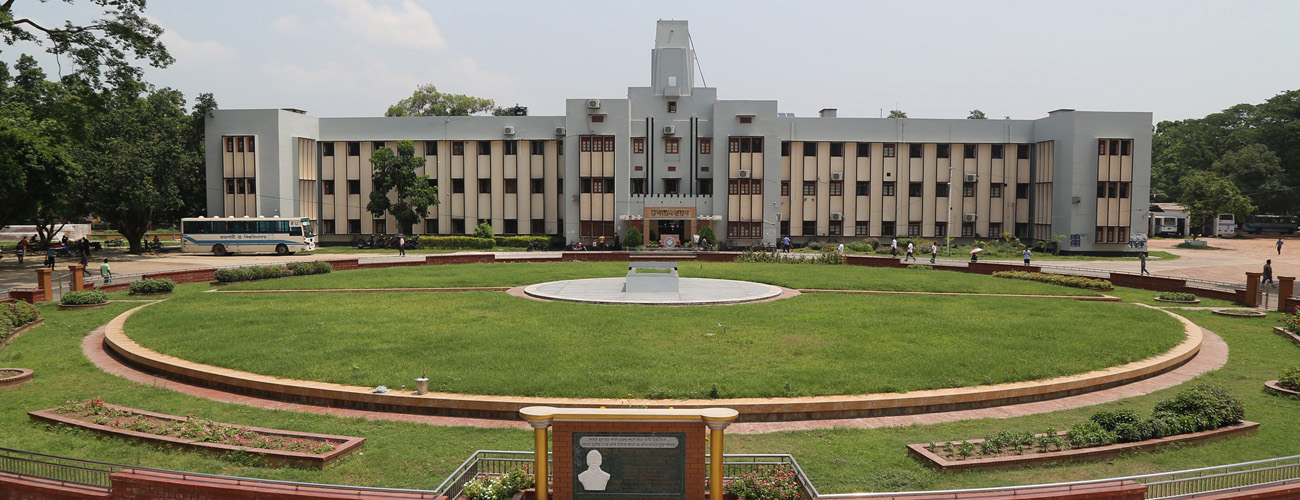Rules and Regulations of Undergraduate Program
Duration of Course and Course Structure (Ref. Academic Ordinance Faculty of Engineering (AOFE) article no-4)
-
- The B. Sc. Engg. programmes shall extend over a period of four academic years, each of a normal duration of one calendar year, divided into 2 Semesters; (details are given in Section 7 of the ordinance).
- The curricula of the B. Sc. Engg. Degree in the different departments shall be proposed by the Committee of Courses and approved by the Syndicate on the recommendation of the Academic Council.
- The Committee of Courses shall review the curricula at least once in every Academic Year and recommend changes and revision, if any, to the Faculty, and then the Faculty will recommend to the Academic Council .
- Teaching of the courses is reckoned in terms of credits and the credits allotted to various courses will be determined by the Committee of Courses under the following guidelines;
-
Nature of Course Contact hour/credit Theoretical Lecture 1 hour/week Laboratory/Project: 2 – 3 hours/week Field Work: 2 weeks -
Contact Hours/week: The total contact hours for the regular students including lecture, tutorial and laboratory shall be between 24 – 42 periods per week, each period being 40 to 60 minutes in duration.
-
Course Adviser: In each degree-awarding department, one of the teachers nominated by the Academic Committee shall act as Course Advisor for each academic year. With the approval of Academic Committee, Course Advisor will prepare and announce the class routine, showing details of the lectures, course plan, class test, etc. at the start of each semester.
-
Course Designation: Each course is designated by a two to four letter word usually identifying the course offering department followed by a four-digit number with the following criteria without any space between letters and numerical.
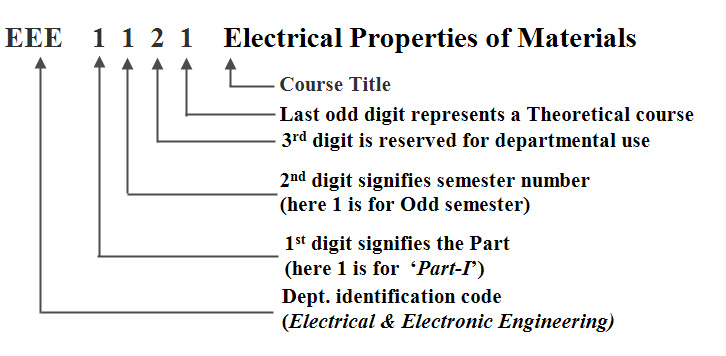
(a) The first digit will correspond to the Part (year) in which the course is normally taken by the students, (b) The second digit will correspond the semester (1 for odd and 2 for even) in which the course is normally taken by the students, (c) The third digit will be reserved for departmental use for such things as to identify different areas within a department, (d) The last digit will be odd for theoretical, even for laboratory courses and ‘0’ for Board Viva voce and (e) The course designation system is illustrated by the following example.
- Duration of Examination [Ref. AOFE article no- 6]
Duration of Theoretical examination of different courses at the end of semester shall be as follows :
| Courses less than or equal to 2 Credits: | 2 Hours |
| Courses greater than 2 credits but less than or equal to 4 Credits: | 3 Hours |
- Academic Calendar [Ref. AOFE article no- 7]
10.1 The academic year shall be divided into two semesters each having duration of not less than 13 teaching weeks.
10.2 There shall be final examinations at the end of each semester conducted by the respective Examination Committee of the Departments.
10.3 An academic schedule for the academic year shall be announced for general notification before the start of the academic year, on the approval of the Academic Committee. The schedule may be prepared according to the following guidelines:
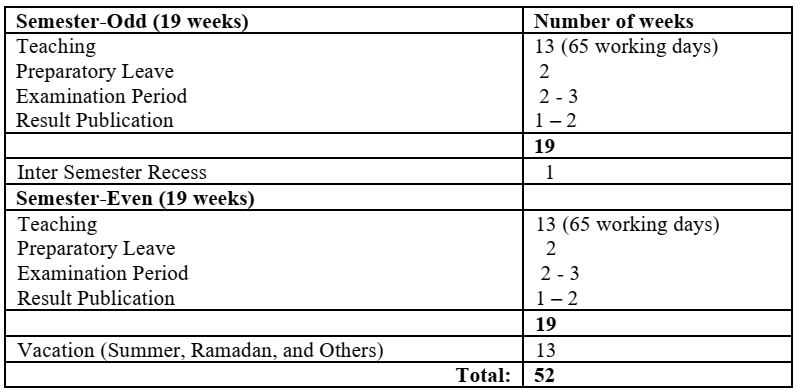
-
Attendance [Ref. AOFE article no-13]
In order to be eligible to appear, as a regular candidate, at the semester final examinations, a student shall be required to have attended at least 70% of the total number of periods of lectures/tutorials/laboratory classes offered during the semester in every course. A student whose attendance falls short of 70% but not below 60% in any course may be allowed to appear at the final examinations as non-collegiate student and he/she shall not be eligible for the award of any scholarship or stipend. A student, appearing the examination under the benefit of this provision shall have to pay in addition to the fees, the requisite fee prescribed by the syndicate for the purpose. Student having less than 60% attendance in any course will not be allowed to appear in the final examinations of the semester. An attendance report of the students will be prepared by the concerned course teacher and posted for information of the students. The basis of awarding marks for class participation and attendance is shown in the following Table.
Table 1: Distribution of Marks in Attendance
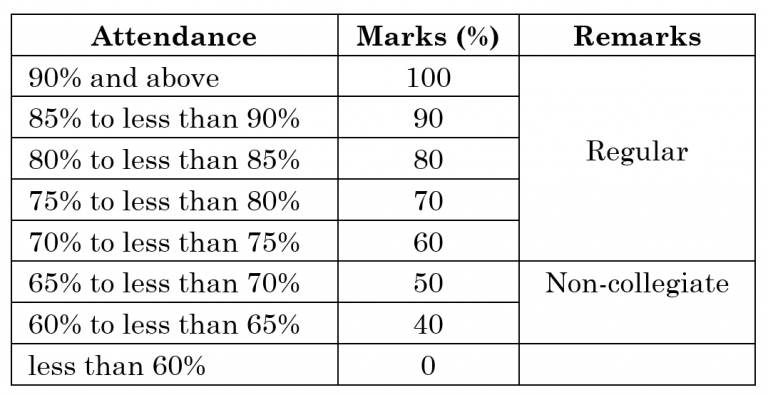
-
Class Test [Ref. AOFE article no- 16]
For theoretical courses of less than or equal to 2 credits there shall be at least three class tests and at least four class tests for greater than 2 credits in a semester. Previous class test marks will remain valid for the reported/ course improvement student if he/she is unable to appear at class test.
-
The Grading System[Ref. AOFE article no-14]
13.1 The letter grade system shall be used to assess the performance of the students as shown in the following Table:
Table 2: Grading System
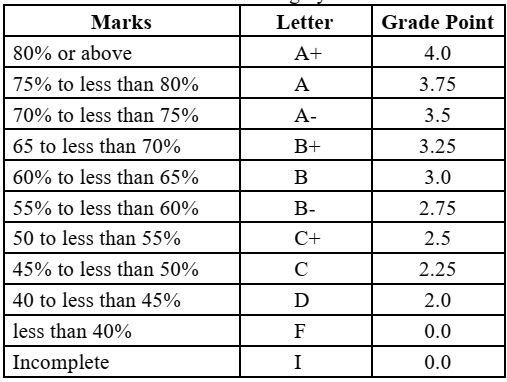
Absence of a candidate in an examination of a course in which he/she ought to have been present will be considered as if the candidate obtained zero marks (‘F’ grade) in that course.
6.2 A Grade Point Average (GPA) shall be calculated for each semester as follows:
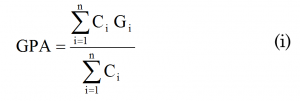
where, n is the number of courses offered during the semester, Ci is the number of credits allotted to a particular course and Gi is the grade point earned for that course.
6.3 A Yearly Grade Point Average (YGPA) shall be calculated for each academic year as follows:

Where 2 is the number of semesters, Cj is the number of credits allotted to the jth semester and Gj is the GPA earned for that semester.
6.4 The Cumulative Grade Point Average (CGPA) gives the cumulative performance of the students from the first year up to the end of the year to which it refers, and will be calculated as follows:

where, m is the total number of years being considered, Ck is the total number of credits registered during the kth year and Gk is the YGPA earned in that particular year.
6.5 A Cumulative Grade Point Average (CGPA) shall be calculated at the end of each academic year and to be communicated to the students along with the YGPAs. The individual grades of courses obtained by them for the semesters of the academic year will, however, be communicated at the end of individual semester by the Chairman of the Examination Committee.
6.6 Both YGPA and CGPA will be rounded up to the second place of decimal for reporting. For instance, YGPA=2.212 shall be rounded up as YGPA=2.22.
6.7 Earned Credit: The courses in which a student has obtained minimum ‘D’ in ‘Theoretical courses’ and ‘C’ in ‘Laboratory courses and Board Viva-voce’ or higher grade will be counted as credits earned by the student. Any course in which a student has obtained ‘F’ grade will not be counted towards his/her earned credit. ‘F’ grade will not be counted for GPA calculation but will stay permanently on the Grade sheet and transcripts.
7. Eligibility for Examination (Ref. AOFE article no-23):
7.1 A candidate may not be admitted to any semester final examination unless he/she has
7.1.1 Submitted application in the prescribed form to the Registrar/Vice-Chancellor for appearing at the examination,
7.1.2 Paid the prescribed examination fees, and all outstanding University and Hall dues,
7.1.3 Fulfilled the conditions for attendance in class and
7.1.4 Been barred by any disciplinary rules.
7.2 On special circumstances the Vice-Chancellor may permit a student to appear at the examination.
7.3 A student whose attendance falls short of 70% but not below 60% in any course as mentioned above may be allowed to appear at the final examinations as a non-collegiate student.
8. Conducting Examination and Rules for Promotion [Ref. AOFE article no-15]
8.1 The academic year shall be divided into two semesters each having duration of not less than 11 teaching weeks (details are given in Section 7 of the Ordinance).
8.2 There shall be final examinations conducted by the concerned Examination Committee of the Departments at the end of each semester.
8.3 The results shall be finalized at the end of the even semester of the academic year. A student entering in an odd semester shall automatically move on to the next semester, unless he/she was barred from appearing at the final examinations at the end of the semester. Individual course grades and GPA shall be announced within a date ordinarily not later than three weeks after the end of the semester final examinations.
8.4 Minimum passing grade: The minimum passing grade in a theoretical course will be D and the minimum passing grade in a laboratory/project/field work/in-plant training/workshop/similar Courses (henceforth referred to as laboratory course) and Viva voce will be C.
8.5 Promotion to higher class: In order to be promoted to higher class a student must obtain the following requirements:
i) Yearly Grade Point Average (YGPA) of 2.25 or higher
ii) Credit point loss (F or I Grade) in the theoretical courses not more than 10.
iii) Minimum C grade in the laboratory courses and viva-voce.
8.6 Course Improvement: A promoted student may appear for only theoretical course improvement in the immediate next academic year for maximum 10 credit points to clear his/her F grade or to improve the grades on the courses in which less than B grade (including those of F grade) was obtained in Part-1, Part-2 and Part-3 examinations. In such case, the student has to give his/her choice of course/courses for course improvement in writing. If the student fails to clear his/her F grades in the first attempt, he/she shall get another (last) chance in the immediate next year to clear the F grades. In every case a student has to carry his previous marks on CA. In the case of student’s failure to improve his/her course grade at the course improvement examination, the previous grade shall remain valid.
8.7 Course Exemption: Students who fail to be promoted to the next higher class shall be exempted from taking the theoretical and laboratory courses where they obtained grades equal to B or above. These grades would be counted in calculating GPA in the next year’s examination results.
8.8 Merit Position: The YGPA obtained by a student in the semester final examinations will be considered for determining the merit position for the award of scholarships, stipends etc.
9. Publication of Results [Ref. AOFE article no-17]
9.1 Award of degree: In order to qualify for the B.Sc. Engg. degree, a student must have to earn minimum 150 credits and a minimum CGPA of 2.25 within a maximum of six academic years. The result will be published in accordance with merit.
9.2 Honours: Candidates for Bachelor degree in engineering will be awarded the degree with Honours if their earned credit is 160 and CGPA is 3.75 or higher.
9.3 Result Improvement: A candidate obtaining B.Sc. Engg. within 4 or 5 academic years shall be allowed to improve his/her result, of maximum of 10 credit points (courses less than ‘B’ grade) of the Part-IV theoretical courses in the immediate next regular examination after publication of his/her result. No improvement shall be allowed for laboratory examinations and Board Viva-voce. If a candidate fails to improve CGPA with the block of new GP in total, the previous results shall remain valid.
9.4 Readmission and Course Exemption: If a student fails to obtain the degree within 4 or 5 academic year, he/she will be readmitted in Part-4 and will appear for the exam according to the clause 15.6. Course exemption rules will also be valid according to clause 15.7.
9.5 Dean’s List: As a recognition of excellent performance, the names of students obtaining a cumulative GPA of 3.75 or above in two regular semesters in each academic year may be published in the Dean’s List in the faculty. Students who have received an ‘F’ grade in any course during any of the two regular semesters will not be considered for Dean’s List in that year.
9.6 Recording of Result: The transcripts in English will show the course designation, course title, credit, letter grade, grade point of individual courses, YGPA of each year, and finally, CGPA.

